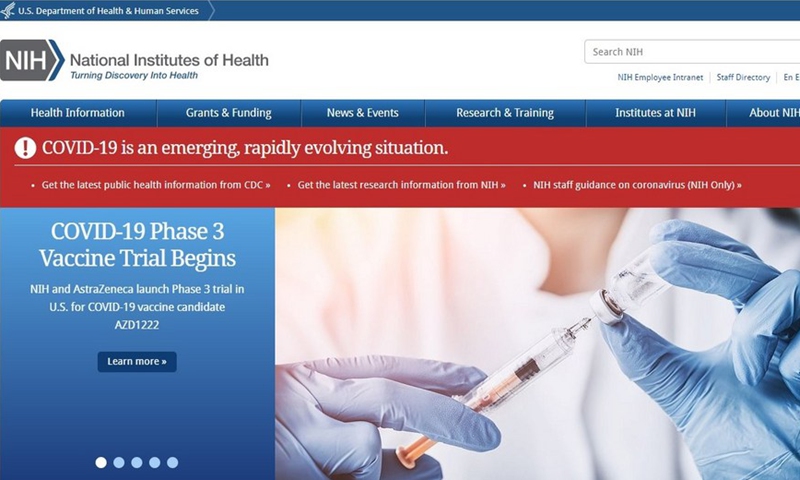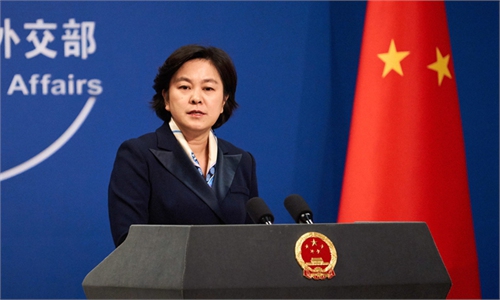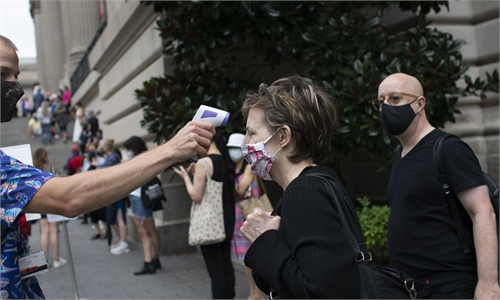
A screenshot taken from the website of the U.S. National Institutes of Health (NIH) on Sept. 1, 2020 shows the title and photo of its latest publication "COVID-19 Phase 3 Vaccine Trial Begins." Photo: Xinhua
Instead of participating in a global vaccine program led by the World Health Organization (WHO) like the other 172 member states, the US chose a go-it-alone strategy to develop a vaccine despite the obvious benefits that it would bring to public health in the country; Chinese analysts said the strategy is a dangerous gamble if the country loses in the vaccine-development race, criticizing the Trump administration's selfishness out of political considerations.
According to a report by The Washington Post on Wednesday early morning, the US' Trump administration said it would not join the COVID-19 Vaccine Global Access (COVAX) to develop, manufacture and equitably distribute a coronavirus vaccine, in part because the WHO is involved, saying that the decision could shape the course of the pandemic and the country's role in health diplomacy.
According to the WHO, 172 countries and multiple candidate vaccines are engaged in COVAX Facility, which aims to speed up vaccine development and secure enough doses to protect the most vulnerable people, such as health workers and the elderly.
The plan is backed by traditional US allies, including Japan, Germany and the European Commission, the executive arm of the European Union, said the Washington Post.
At a routine press conference on Wednesday, Chinese Foreign Ministry spokesperson Hua Chunying expressed China's support for COVAX, noting that China has been in communication with the WHO and other sponsors of the plan.
According to Hua, competent Chinese authorities and vaccine companies held a video conference on Tuesday with the WHO, the Global Alliance for Vaccines and Immunization, the Vaccine Alliance and the Coalition for Epidemic Preparedness Innovations to further exchange views on relevant issues and agreed once again to jointly advance the global research, development, production and distribution of COVID-19 vaccines.
Nine of China's vaccine candidates have entered clinical trials, and four have been approved for Phase III clinical trials in foreign countries, Hua noted.
Yang Zhanqiu, deputy director of the pathogen biology department at Wuhan University, told the Global Times on Wednesday that the program is inclusively beneficial for human-beings, stressing that countries such as the US should have turned their focus away from "winning" the race. Yang said vaccine development is a global effort and hard to win without cooperation.
Li Haidong, a professor at the Institute of International Relations of the China Foreign Affairs University, said the US not participating again reflects its selfishness which is that no other country can gain advantages from it for free, and the country apparently has no intention to share its coronavirus information and vaccine information with others.
The US's back-out is in part because the White House does not want to work with the WHO, which President Trump has chastised, for what he characterized as its "China-centric" response to the pandemic, the Washington Post said.
Judd Deere, a spokesman for the White House, said that "we will not be constrained by multilateral organizations influenced by the corrupt World Health Organization and China."Li said that such a move is the US'old trick to resist China-linked plans and incite certain other countries to boycott them, which can be described as US-style "political correctness."
The current US diplomatic policy is indeed, extreme egocentrism and nationalism. The Trump administration now totally regards vaccine development, which is essentially a key topic close to public health and the safety of human life, as a political weight.
Who will win the race for a vaccine remains unclear, but the result will influence the US' health diplomacy policy and its role in the international community, Chinese experts said.
With the US' decision to skip over the global vaccine effort, if none of its vaccine candidates are viable, the country would be left behind with no options.



